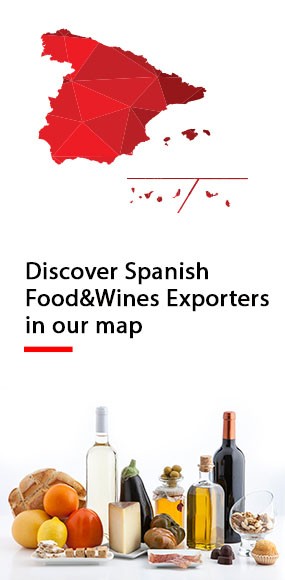.png.transform/rendition-xs/image_image%20(1).png)
The Sustainable Revolution in Spain's Aquaculture Industry
Spain's aquaculture industry is currently facing new challenges related to food sustainability and animal welfare, areas in which it's also a leader compared with international rivals.
Spain's aquaculture industry is currently facing new challenges related to food sustainability and animal welfare, areas in which it's also a leader compared with international rivals. Moreover, the industry's position aligns perfectly with the European Union's strategy, "Farm to Fork," which supports farmers, stockbreeders, fish farmers and fishermen in connection with food sustainability throughout the value chain.
Below we look at several success stories in the Spanish aquaculture industry which have experienced growth due to their quality, excellence and sustainability.
Aquanaria, raising large sea bass in the Atlantic Ocean
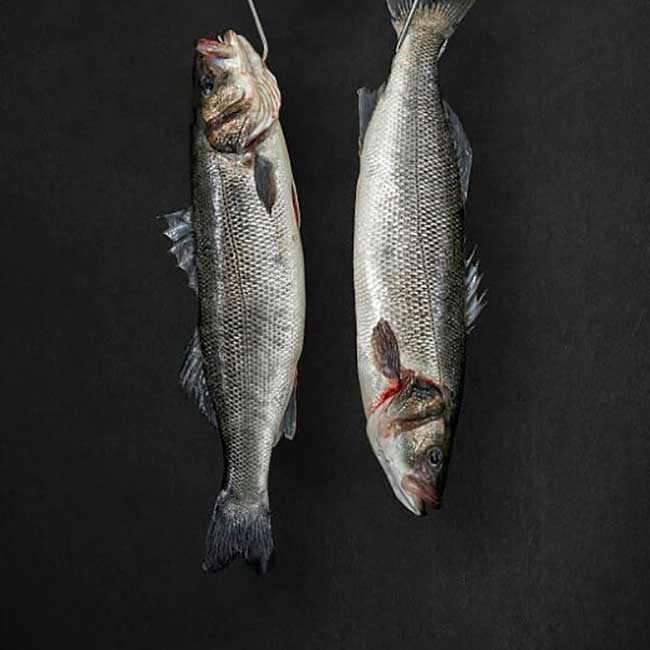
Aquanaria's sea bass are a gourmet product. They stand out for their large size and firm texture due to the four years they spend swimming in the harsh, open waters around Gran Canaria island. Pedro Sánchez, the company's commercial director, tells Foods & Wines from Spain, “Our fish rearing system comprises net pens in the Atlantic Ocean's open seas. We look for open areas with deep water and considerable currents and waves. We work with low densities and produce fish ranging from 1 to 4 kilograms (2 kilograms on average), which take around 4 years to grow. We eliminated meat by-products from their diet and we only use fish meal and vegetables."
Although Aquanaria was founded in 1973 with the production of diverse species (prawns, oysters, clams, turbot, gilt-head bream and sea bass), they headed to the Canary Islands in the 1980s in search of the ideal habitat to grow and produce sea bass, which is what they wanted to farm at the time. According to Sánchez, "Over the years we have developed our own technology to allow us to access more open areas where the water quality was excellent, and the sea bass were in their best environment. At the same time, we have been trying different feeds with a view to finding the one that best adapts to sea bass and achieves superior organoleptic qualities."
They currently export to 22 countries and their main market is the US, followed by Italy, France, the Netherlands, Germany, the UK, the Middle East, Hong Kong and South Korea.
Esteros del Guadalquivir, Andalusian tradition
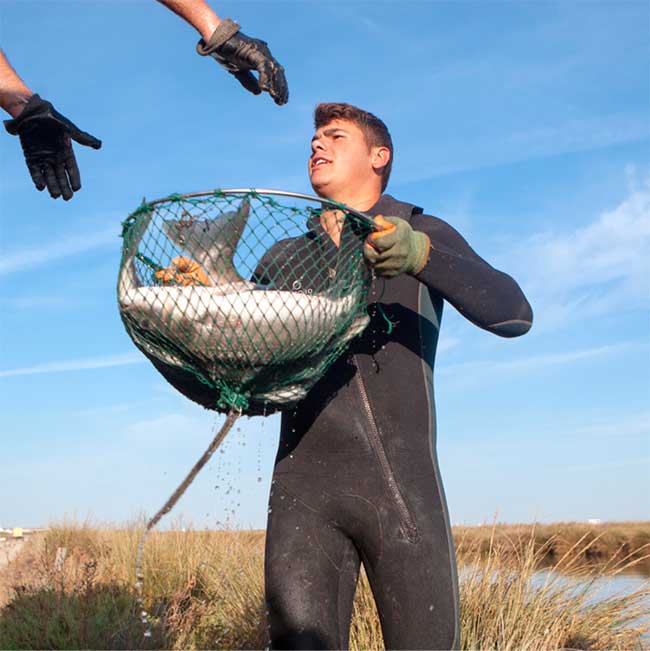
Esteros del Guadalquivir are aware of their privileged location and the responsibility that comes with it. They're located amid the Guadalquivir marshes, in the last portion of the river, beside Doñana National Park. There they use a traditional technique, salt marsh fish farming which involves manually casting the net, a method which requires teamwork, coordination and lots of hard work.
The director of Esteros del Guadalquivir, Francisco Romero, spoke about the advantages of this fish farming method to Foods & Wines from Spain: "Salt marsh fishing does no harm to the fish as they are extracted from the water in small nets where only a few fit. Moreover, this allows us to fish on demand, ensuring that our sea bass and gilt-head bream are as fresh as possible, and as soon as they're caught they're placed in ice water to eliminate stress, which is beneficial for their quality and texture.”
The company's commitment to preserving the ecosystem has led to a special recognition: the estuary is the first to be declared an ecological reserve. Among other tasks, the company works daily to preserve the marshes and implement environmental improvements which are very positive for both their aquaculture activity and also for the water birds that live there.
Esteros del Guadalquivir distributes its products to international clients, primarily fish and seafood wholesalers and distributors in Italy, France and Portugal, the latter being its primary export market.
Stolt Sea Farm, turbot and sole
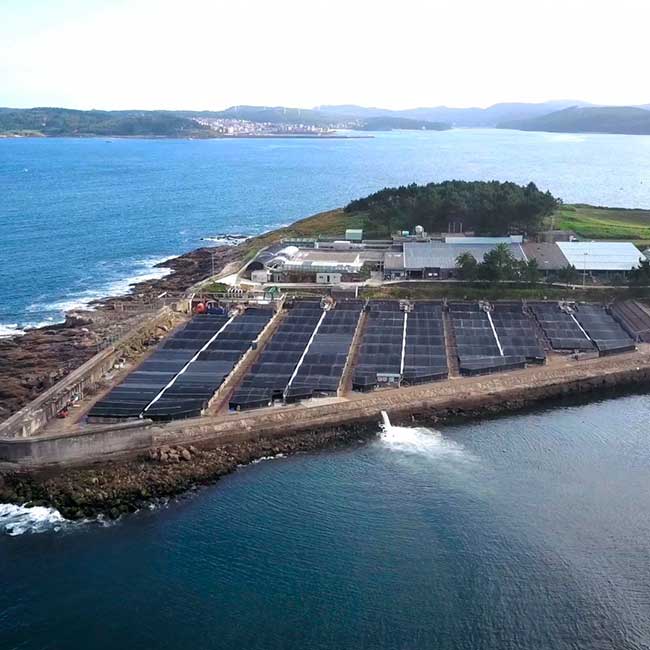
This company, Stolt Sea Farm, is the Spanish subsidiary of multinational group Stolt Nielsen-Limited, which has been committed to sustainable development in aquaculture for decades. In Spain, their products are sold under brand names like Prodemar, King Turbot and King Sole, and they also have several innovation projects under way.
According to Manuela Gómez, the company's Business Development Manager, “Our main research most recently into turbot and sole is focused on the development of tools to prevent the diseases that affect these species and of feed that maintains the fish's quality and is sustainable." Being part of an international group allows them to "leverage synergies in certain markets and take advantage of the experience and expertise of other units in the group."
Pirinea, caviar from the Pyrenees
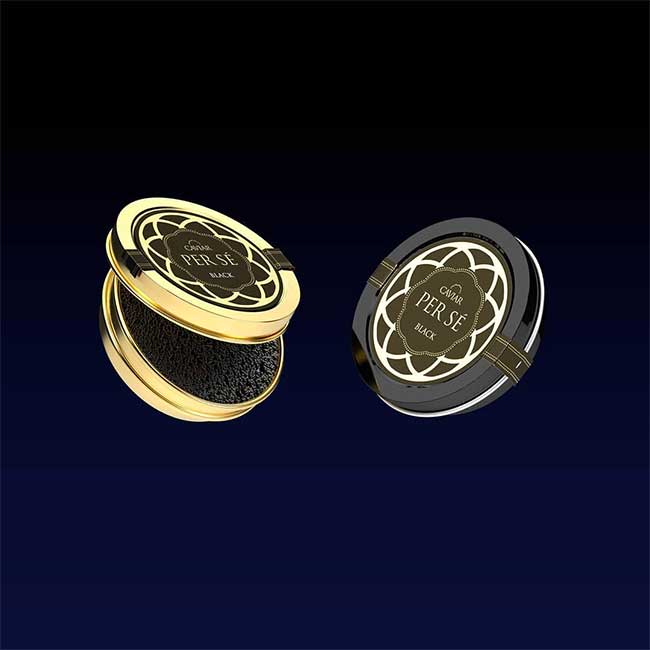
This may surprise lots of people, but it's 100% true. Premium sturgeon caviar is made in the cold, clean waters of the Spanish Pyrenees. One of the leaders of this project is Laurent Villaeys-Sakalian, a partner in Pirinea, the company with several fish farms in the magnificent valleys of this mountain range. The waters come directly from the basins protected by the Pyrenees, such as the Ordesa and Monte Perdido National Park and the Ordesa-Viñamala Biosphere Reserve.
Villaeys-Sakalian told Foods & Wines from Spain that “This unique location provides us with water of the highest quality from the thaw and ensures unparalleled quality in our production and also food safety." One of their fish factories, in Yesa, is the first in the EU to obtain the European certification for organic aquaculture: "Consumers increasingly want a safe and healthy product. With our extensive track record and experience as fish farmers, we know that the most rigorous quality certifications help us stand out and increase the prestige of our brand."
Exports head primarily to France but also to Belgium, Italy, Germany, Sweden, the Czech Republic, Estonia, Lithuania, Poland, etc. Outside the EU, they have a presence in Japan, Australia, Taiwan and the US.
Text: Rodrigo García Fernández /@ICEX
Translation: Samara Kamenecka/@ICEX

